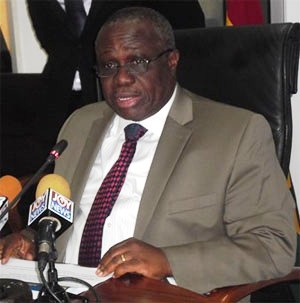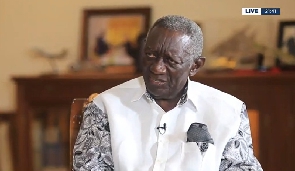Business News of Wednesday, 23 July 2014
Source: BFT
Court order's BoG to respond to cedi case
The Supreme Court yesterday ordered the Bank of Ghana (BoG) to respond to the actual issues in the case on whether it has provided a stable currency in accordance with the constitution while deferring a ruling on the central bank’s preliminary objection until the response is filed.
John Ephraim Baiden, a lawyer and banking lecturer, filed the case in the country’s apex court in March seeking among others a declaration that “upon a true and proper interpretation of Article 183(2)(a) of the 1992 Constitution and Bank of Ghana Act 2002, Section 4(b), the Bank of Ghana has neither promoted nor maintained a stable currency for the Republic of Ghana.”
When it was served with the suit, the central bank raised a preliminary objection that the plaintiff chose the wrong forum to bring his case. The Supreme Court had, therefore, been expected to rule on the objection on Tuesday.
But citing the principle of judicial economy, the seven justices who sat yesterday ordered the Bank of Ghana to answer in substance to the plaintiff’s case before the objection is heard.
“We order the defendants to file a response within 14 days,” Justice Sophia Adinyira, head of the panel hearing the case, said. She did not provide a date for the court’s next sitting on the case, known as John Ephraim Baiden v The Attorney-General and The Bank of Ghana.
The Attorney-General had no representative in court yesterday and is yet to file a response.?The plaintiff asserts in his case that the level of depreciation of the cedi over time does not show the central bank to be complying with its mandate in Article 183(2)(a) of the constitution and in Section 4(b) of the Bank of Ghana Act, 2002, to promote and maintain a stable currency for economic progress.
Article 183(2)(a) of Ghana’s constitution says: “The Bank of Ghana shall promote and maintain the stability of the currency of Ghana and direct and regulate the currency system in the interest of the economic progress of Ghana”, and Section 4(b) of the Bank of Ghana Act, 2002, provides that the central bank “shall promote by monetary measures the stabilisation of the value of the currency within and outside Ghana.”
Mr. Baiden, who said the falling currency has caused him to lose wealth through exchange rate losses and that he brought the action in the public interest, wants the Supreme Court to declare principally that the central bank has not provided a stable currency.
He is further asking the court to order the central bank to stabilise the cedi, and he proposes solutions that the court may consider if it issues the order to the bank.
In the central bank’s preliminary objection, its lawyers said the Supreme Court does not have jurisdiction to interpret the Bank of Ghana Act and want the action dismissed from the onset.
The plaintiff in a counter-response also argued that his case primarily involves a constitutional provision –Article 183(2)(a) – which requires interpretation as to what is a stable currency and what is meant by maintaining a stable currency. Thus, it falls within the jurisdiction of the court to make the relevant declarations, Mr. Baiden said.
The case could have a profound impact on economic management given its invitation to the Supreme Court to define a stable currency and give guidance to the Bank of Ghana on how to achieve it.
It comes amid a rapid depreciation of the cedi, which has triggered an extraordinary policy-response from the Bank of Ghana. Apart from raising interest rates in February and July, the bank launched fresh currency regulations to stem the slide.
But despite the measures, the currency has lost 27 percent against the dollar since January, raising inflation to 15 percent in June – the highest for four and a half years. The cedi now trades at an official average rate of 3.03 to the dollar compared to 2.16 in December.
Banks and currency traders say a shortage of dollars and weak supplies from the central bank have caused the cedi’s pernicious fall.
Mr. Baiden reckons the Bank of Ghana does not have sufficient reserves to operate a floating exchange rate system and wants the court to order it to change to a fixed exchange rate regime or an adjustable currency peg.
In July the central bank said its reserve buffers have declined by US$1.1billion since December to US$4.5billion, but added that it expects an improvement when funds from the annual cocoa loan and the upcoming Eurobond are received.
According to the International Monetary Fund (IMF), the Bank of Ghana needs around US$8billion of reserves to cushion the country against plausible external shocks.











